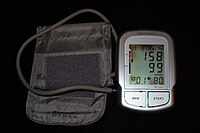
Photo from wikipedia
Abstract BACKGROUND: Prediabetes affects 84.1 million Americans and is a primary determinant of type 2 diabetes (T2D). Moreover, 90% of U.S. adults with prediabetes are unaware that they have prediabetes.… Click to show full abstract
Abstract BACKGROUND: Prediabetes affects 84.1 million Americans and is a primary determinant of type 2 diabetes (T2D). Moreover, 90% of U.S. adults with prediabetes are unaware that they have prediabetes. Greater consumption of added sugar is positively associated with prediabetes and T2D and Americans consume ~17 tsp. (71.4 g) of added sugar daily. Given that prediabetes awareness may influence dietary behavior, including consumption of added sugar, we test the hypothesis that prediabetes awareness is associated with reduced consumption of added sugar. METHODS: We performed a secondary data analysis using the 2013-2014 National Health and Nutrition Examination Survey and the USDA Food Patterns Equivalent Database. Individuals with prediabetes (HgA1c ≥5.7% and ≤ 6.4%) were dichotomized by awareness of their prediabetes diagnosis as confirmed by a healthcare provider (yes/no). Survey-weighted OLS regression was used to test whether being aware of having prediabetes was associated with reduced consumption of total added sugar intake (g/day) among individuals over the age of 20, controlling for sociodemographic covariates. RESULTS: 1,169 individuals were identified as having prediabetes, with 92% of the sample unaware of their condition and reported consuming, on average, approximately 16.7 tsp. equivalents (70 g/day) of added sugar (70 g/day). Awareness of having prediabetes was not significantly associated with consumption of added sugars (b=-2.21, p=0.3197). CONCLUSION: While our results indicate that, on average, prediabetes awareness is not associated with decreased consumption of added sugar, the findings have important clinical implications; specifically, early implementation of lifestyle modifications, including reducing added sugar, that may slow or prevent the onset of T2D. Dietary education, particularly as it relates to sources of added sugar, should be considered primary care for persons with prediabetes. References: (1) Centers for Disease Control and Prevention. National diabetes statistics report, 2017. 2017; https://www.cdc.gov/diabetes/data/statistics/statistics-report.html. Accessed April 20, 2017. (2) Stanhope KL. Sugar consumption, metabolic disease and obesity: The state of the controversy. Crit Rev Clin Lab Sci. 2016;53(1):52-67. (3) Bardenheier BH, Cogswell ME, Gregg EW, Williams DE, Zhang Z, Geiss LS. Does knowing one's elevated glycemic status make a difference in macronutrient intake? Diabetes Care. 2014;37(12):3143-3149.
Journal Title: Journal of the Endocrine Society
Year Published: 2019
Link to full text (if available)
Share on Social Media: Sign Up to like & get
recommendations!